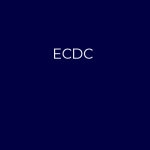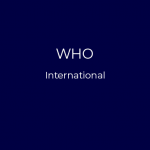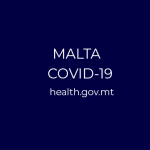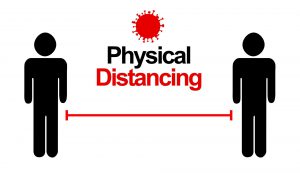MCAST COVID-19
Information Page
The health and safety of our community is our top priority. We know that many people are understandably concerned about the current pandemic situation. MCAST is taking increased health and safety measures to address these concerns while ensuring that learning can continue. As the situation continues to develop, please stay updated by visiting mcast.edu.mt/covid19 for the latest information. You can also visit the circulars section for all the official messages sent to staff and students.









- Communicable disease threats report, 21 - 27 February 2026, week 9by ECDC on February 27, 2026 at 4:07 pm
This issue of the ECDC Communicable Disease Threats Report (CDTR) covers the period 21 - 27 February 2026 and includes updates on respiratory virus epidemiology in the EU/EEA, mass gathering monitoring, chikungunya, cholera, and swine flu.
- Weekly respiratory virus update, week 8, February 2026by ECDC on February 27, 2026 at 12:24 pm
Respiratory virus trends across the EU/EEA show early signs of decline. RSV activity remains high, with young children most affected. Influenza circulation remains widespread, but continues to decrease in most countries. SARS CoV 2 activity remains low.
- Communicable disease threats report, 14 - 20 February 2026, week 8by ECDC on February 20, 2026 at 3:46 pm
This issue of the ECDC Communicable Disease Threats Report (CDTR) covers the period 7 - 13 February 2026 and includes updates on respiratory virus epidemiology in the EU/EEA, mass gathering monitoring, avian influenza, and mpox.
- Weekly respiratory virus update, week 7, February 2026by ECDC on February 20, 2026 at 10:54 am
Respiratory virus activity remains elevated across the EU/EEA: influenza transmission is still widespread but decreasing, and RSV levels remain high, while SARS CoV 2 circulation remains low.
- Communicable disease threats report, 7 - 13 February 2026, week 7by ECDC on February 13, 2026 at 4:19 pm
This issue of the ECDC Communicable Disease Threats Report (CDTR) covers the period 7 - 13 February 2026 and includes updates on respiratory virus epidemiology in the EU/EEA, mass gathering monitoring, avian influenza, chikungunya, dengue, Nipah virus disease, and measles.
News (English) - World Health Organization Corporate news releases, statements, and notes for media issued by the World Health Organization.
- Recommendations for influenza vaccine composition for the 2026-2027 northern hemisphere seasonon February 27, 2026 at 10:01 am
The World Health Organization (WHO) today announced recommendations for the viral composition of influenza (or “flu”) vaccines for the 2026-2027 northern hemisphere influenza season. The announcement was made following a 4-day consultation examining global influenza surveillance data.
- Denmark becomes first country in the European Union to eliminate mother-to-child transmission of HIV and syphilison February 26, 2026 at 5:17 pm
The World Health Organization (WHO) has certified Denmark for the elimination of mother-to-child transmission (EMTCT) of HIV and syphilis, recognizing the country's sustained commitment to ensuring every child is born free of these infections.
- WHO Director-General visits Jordan to recognize strong collaboration on health system delivery, emergency relief and advancing mental healthon February 25, 2026 at 6:06 pm
The Director-General of the World Health Organization, Dr Tedros Adhanom Ghebreyesus, today concluded the first day of his two-day State visit to the Hashemite Kingdom of Jordan, underscoring the strong partnership between WHO and Jordan across the areas of universal health coverage (UHC), mental health and humanitarian health action.
- Attacks on Ukraine’s health care increased by 20% in 2025on February 23, 2026 at 4:14 pm
As Ukraine enters the fifth year of full-scale war, its people have endured the highest number of attacks on their health care in 2025 – increasing by nearly 20% compared to 2024.Since the beginning of the full-scale war on 24 February 2022, WHO has documented at least 2881 attacks on health care in Ukraine, affecting health workers, facilities, ambulances, and medical warehouses.Health services are under intense pressure in two fronts: direct attacks on health care, and the cascading effects of strikes on civilian infrastructure, including thermal power plants that underpin the country's power grid. These have left deep gaps in people’s health. According to a WHO assessment conducted in December 2025, 59% of people in frontline areas reported their health as poor or very poor, compared to 47% in non-frontline areas."After four years of war, health needs are increasing, but many people are unable to get the care they need, in part because hospitals and clinics are routinely attacked," said Dr Tedros Adhanom Ghebreyesus, WHO Director-General. "WHO is working alongside Ukraine's dedicated health workers to keep hospitals supplied with the means to stay warm, and the medicines people rely on the most. Ultimately, the best medicine is peace.”In 2025, WHO’s support reached 1.9 million people across Ukraine through service delivery, medical supplies, referrals and capacity-building, with a strong focus on frontline and hard-to-reach locations."Four years of war has created a serious health crisis in Ukraine," said Dr Hans Henri P. Kluge, WHO Regional Director for Europe. "Mental health needs are staggering: 72% of people surveyed experienced anxiety or depression in the past year, yet only one in five sought help. Cardiovascular disease is surging, with one in four Ukrainians experiencing dangerously high blood pressure. And 8 out of 10 people report they can’t access the medicines they need. This is not abstract – it's a heart patient who can't find blood pressure medication, an amputee waiting months for a prosthetic, a teenager too afraid to leave the house. Ukraine's health system needs our sustained support.”Attacks on health careIn a year marked by hope for peace talks, the reality on the ground told a different story. Attacks on health care intensified, reaching a peak in the third quarter of 2025, when 184 attacks claimed the lives of 12 people and injured 110 health workers and patients. At the same time, attacks on medical warehouses tripled in 2025 compared with the previous year, disrupting logistics and supply chains that are critical to delivering care across the country. Over the past four years, 233 health workers and patients have been killed and 930 injured in attacks on health care. Such attacks constitute violations of international humanitarian law.Impact of destruction on essential health servicesThis winter has been the harshest since the war began, with multiple strikes on energy infrastructure leaving millions without heating, electricity, and water. Many of Ukraine's combined heat and power plants have been damaged or destroyed. In Kyiv alone, a January 2026 attack left nearly 6000 buildings without heat in subzero conditions, prompting an estimated 600 000 residents to flee the capital."What we are witnessing in Ukraine is a devastating cycle. A heating station is struck and thousands of homes lose heat within hours. At – 20°C, water in the pipes freezes, bursts them, floods buildings with ice. Repairs are made, then the next attack starts it all over again. Behind every one of these system breakdowns are families, elderly residents, and health-care workers who must keep saving lives while their own homes are without heat, water, or electricity. The burnout after four years of war is immense – and the demand for health care has never been higher," said Dr Jarno Habicht, WHO Representative to Ukraine.The impact does not end at the hospital door. New mothers discharged after giving birth, patients recovering from injuries or heart attacks, and those awaiting or recovering from critical cancer surgeries return home to apartments without heating, electricity, or running water. Care that begins in a functioning hospital is undermined when patients recover in freezing, dark homes, turning medical progress into a daily struggle for survival.Growing health needsThe rise in war-related trauma injuries has driven a growing demand for surgery, blood products, infection prevention and control, prevention of antimicrobial resistance, mental health services, and rehabilitation.Access to rehabilitation remains severely limited. Only 4% of hospitals providing inpatient rehabilitation and only 3% of facilities offering assistive technologies such as prosthetics and corrective devices.Access to medicines is among the most persistent barriers to health in Ukraine, with 4 out of 5 people reporting difficulties, primarily due to high prices (71%). In frontline regions, closed pharmacies, security risks, and financial constraints make the situation even more acute.WHO’s work in UkraineIn 2025, WHO worked to reach communities through multiple mechanisms, by prioritizing the most vulnerable people in hard-to-reach areas. The work spanned the full continuum of health:Crisis response: delivered trauma care and medical supplies to 954 facilities, supported over 1200 medical evacuations, and run outreach in 131 hard-to-reach locations;Recovery: sustained primary health care, noncommunicable disease treatment and mental health services for displaced and conflict-affected populations; andRehabilitation: rebuilt damaged facilities, installing modular clinics, and training over 2500 health workers to restore and strengthen a battered health system.To help maintain essential health services, WHO has provided 284 generators to health facilities across 23 oblasts in Ukraine. For 2026, WHO is appealing to raise US$ 42 million in funding to sustain its work in Ukraine and to protect access to care for 700 000 people.
- WHO validates elimination of trachoma as a public health problem in Libyaon February 18, 2026 at 2:24 pm
WHO today announced that Libya has eliminated trachoma as a public health problem, a landmark victory for public health in WHO’s Eastern Mediterranean Region. This hard-won achievement protects future generations from preventable blindness and provides a powerful reminder that countries can overcome neglected tropical diseases despite persisting challenges.








 MCAST Main Campus
MCAST Main Campus  +356 2398 7100
+356 2398 7100
 information@mcast.edu.mt
information@mcast.edu.mt